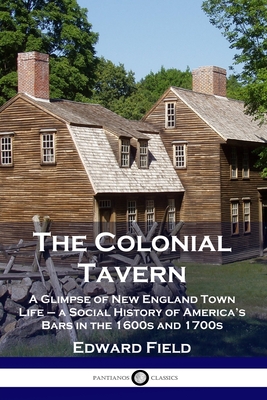
Field, Edward
Writing at the end of the 19th century, Field makes use of a variety of sources that mention the tavern and its role. It is apparent that inns were the central hub of activity in the villages and small townships that constituted colonial North America. Many laws were drafted as to the proper running of these bars, and the tavern keeper was a profession with standards refined over the course of decades. The conduct of citizens was a concern; while noting how taverns had positive effects in building community spirit in localities, some colonial officials legislated against public drunkenness and disorder.
The everyday functions of the tavern are brought to life by Field, who appends order lists for food and drink supplies, and stories concerning various inns. We gain an impression of colonial life, how whole towns became established with inns at their centre, a gathering place for local folk of all description. Some tavern keepers were accomplished businessmen; as well as managing their accounts and supplies, and keeping order on the more raucous evenings, they arranged entertainments and events to keep customers joyful and satisfied.







